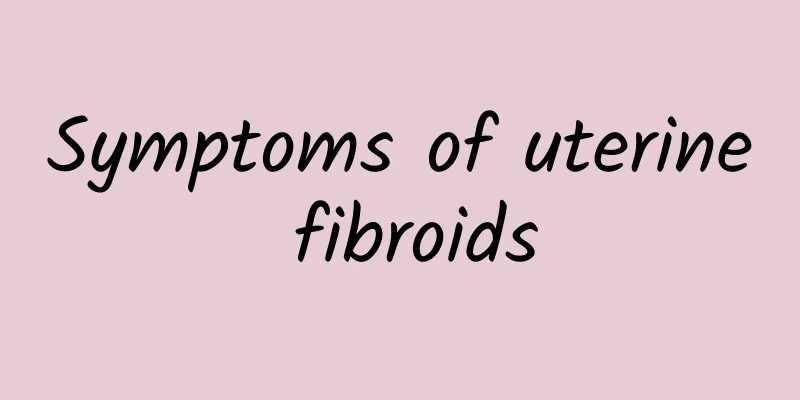Symptoms of uterine fibroids

|
What are the symptoms of uterine fibroids? Uterine fibroids are a type of female disease, and this disease is also a common disease. For this reason, we must take it seriously. We know that uterine fibroids are a benign tumor, and the causes of this disease are also different. For this reason, we must pay close attention to it. So, what are the symptoms of uterine fibroids? 1. Menstrual changes If your menstrual cycle changes, your menstrual blood volume increases, or your period is prolonged, you need to be alert. 2. Pain: Most patients with uterine fibroids do not feel pain, but a small number of people may experience lower abdominal pain after the fibroids become infected or the uterus becomes deformed. 3. Lumps can be felt in the lower abdomen, especially when the bladder is full of urine. The more painless and itchy lumps are, the more you should be wary of them. 4. Feeling of pressure. Most patients with uterine fibroids do not feel anything. However, if the fibroid is located low, even if the tumor is not large, it can compress adjacent organs. For example, if it compresses the bladder, urination difficulties may occur; if it compresses the rectum, defecation difficulties may occur; if it compresses the ureter, symptoms such as back pain may occur. 5. Infertility: A small number of patients with uterine fibroids may be infertile. The reason is that the fibroids cause the uterus to deform, making it difficult for the fertilized egg to implant. Experts say that if we don’t treat it well, it’s easy to cause unnecessary harm: The blood supply of uterine fibroids comes from the myometrium, and its blood vessel wall lacks an outer membrane. Compression of the capsule or pedicle can cause obstruction of the blood supply to the muscle. Liquefaction or cystic change: As the hyaline degeneration continues to develop, it gradually forms many small cavities of varying sizes from liquefaction, and even merges into a large cystic cavity. The cystic muscle is very soft, resembling a pregnant uterus. Uterine fibroids can cause pathological changes, so what is the incidence of uterine fibroids? The incidence of uterine fibroid degeneration is 0.13%-1.39%, mainly flesh degeneration. At this time, the uterus becomes soft and grows fast, often accompanied by irregular bleeding or excessive menstruation. |
<<: What symptoms can be used to preliminarily diagnose whether ovarian cysts affect menstruation?
>>: What is pelvic inflammatory disease
Recommend
What is the treatment for cervical hypertrophy?
Cervical hypertrophy is a common gynecological di...
Does cervicitis need treatment?
Whether cervicitis needs treatment depends on the...
How to treat pelvic inflammatory disease so that it does not recur?
Many women find that pelvic inflammatory disease ...
Vegetables can also be easily cooked in an air fryer! 3 delicious low-sugar vegetarian dishes, ready in half an hour
The difficulty in losing weight is not in getting...
How to successfully preserve the fetus during threatened abortion
Threatened abortion refers to a small amount of v...
3 ways to eat high-quality walnut oil to lose weight
In the season when clothes become thinner and thi...
4 Diet Tips for Losing Weight through Exercise
You have worked out very hard, but your weight re...
What is vaginal prolapse and what are its main causes? Women should avoid this social embarrassment
Ms. Li, a woman who is vigorous and decisive in t...
Is it necessary to eat breakfast? Eat real eggs, 6 tips to control weight without eating fat
People often say, "Eat breakfast like a king...
Postpartum yoga creates a more slender figure than before pregnancy! (superior)
Many people think that yoga is just a series of s...
Treatment of pelvic inflammatory disease
Pelvic inflammatory disease can be said to be a c...
How much does it cost to see a doctor for early stage endometriosis?
As our living standards continue to improve, our ...
How to care for acute pelvic peritonitis
Many female friends do not pay attention to their...
Will getting angry cause abnormal vaginal discharge? Be careful to identify
Getting angry can cause abnormal vaginal discharg...
Broccoli has three benefits and is a good partner in fighting cancer, but nutritionists remind people to be cautious when eating it.
Have you eaten vegetables today? According to the...









